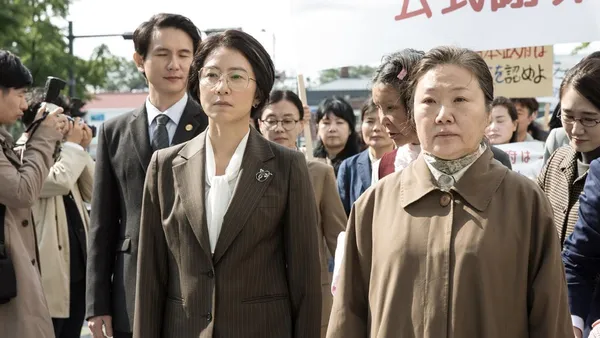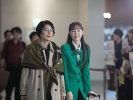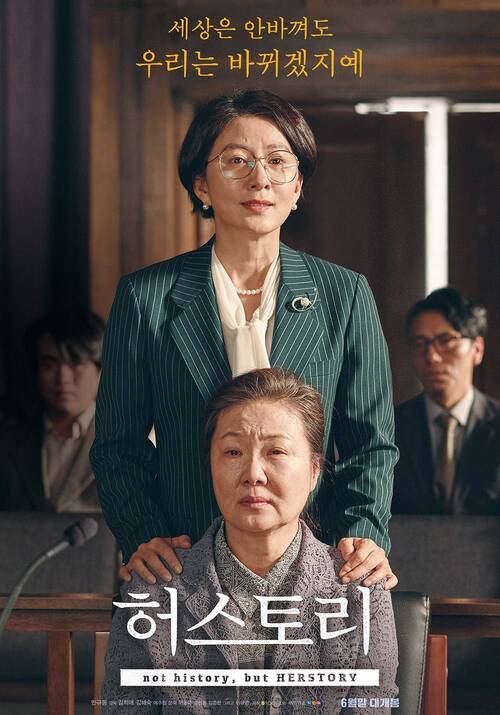Eye For Film >> Movies >> Herstory (2018) Film Review
Herstory
Reviewed by: Jennie Kermode

It is now widely accepted as historical fact that between 1932 and 1945, somewhere between 80,000 and 200,000 women and girls, predominantly from Korea, China, the Philippines and Vietnam, were forced or coerced into sexual slavery by the Japanese army. A high proportion of them died, many of them acquired permanent physical or mental disabilities, and around half were left infertile. The uncertainty about the numbers applies partly because of the uncertainty which always surrounds war, but partly due to the tremendous social prejudice which survivors experienced when they got home. The Japanese had correctly surmised that whereas generalised rape, such as that which took place in Nanjing, was viewed as a war crime, if they presented women as prostitutes and labelled their prisons brothels, it would be the women themselves who would be blamed.
As a consequence of this prejudice, many women kept their wartime experiences secret. it wasn’t until the 1990s that one woman’s decision to speak to the press precipitated an urgent public conversation on the matter, and the support of influential businesswomen led to a series of complainants returning to Shimonoseki, the city where their abuse had begun, to participate in a series of trials which would finally hold the Japanese military to account.

Min Kyu-dong’s Herstory is not the first Korean film to tackle this subject (which remains controversial, a not insubstantial number of Koreans still blaming the victims), but it is the first to focus less on the horrors of the comfort women system than on the actual trials. It is lightly fictionalised, using the complainants’ stories as an opportunity to address a wider range of experiences, but the arc of the story remains the same. This approach gives it room to address supplementary issues around the lasting societal consequences of the atrocities, the changing status of women in both Korea and Japan, the outrage which many younger Japanese people felt when they learned what their country had done during the war, and the question of whether or not it is ever possible to forgive.
The advantage of making a film which is largely about older people is that one has access to highly experienced actors who themselves have less and less access to good roles and are willing to give a story like this their all. That is certainly the case here, and the acclaim which the older stars have enjoyed during their careers gives them an added authority where Korean audiences are concerned. Western viewers may find the score a bit overblown in places (this will be less of an issue for viewers used to a more emotional type of cinema), but the performances are easily strong enough to overcome this, and Min wisely keeps them restrained until critical points when we need to appreciate the extremity of what happened in all its visceral horror.
At the centre of the story, and a far more volatile figure throughout, is Moon Jeong-sook (Kim Hee-ae), a travel agency CEO whose normal operations have been suspended for three months as a result of a scandal. With time and energy to spare, and in need of distraction, she hits upon the idea of helping three survivors to take legal action, and is shocked to discover that her own housekeeper has also experienced this trauma. By focusing on Moon (and occasionally showing us her teenage daughter’s reactions), Min is able to focus the story very much in the present (or at least, in the Nineties, an era which looks close enough to our own to make identification with the characters easier). The decision also adds some moral complexity as Moon is taken to task by a young Korean-Japanese lawyer who suspects she is less interested in justice than she is in winning for its own sake, and forces her to reflect on the toll which the experience is taking on the survivors.
The lawyer is one of a small number of sympathetic men in the film whose presence complicates the gendered aspects of the narrative. His ethnicity and upbringing place him in a sort of middle ground, whilst his Japanese colleagues similarly complicate the notion that the story is straightforwardly about Korea versus Japan. Breaking down those ideas is important to the film’s contention that it is possible to change, face up to the horrors of the past and strive for a future in which we less easily lose sight of each other’s humanity. Prejudice against the survivors is seen in Japan and Korea alike, sometimes shocking in its manifestations, but it serves to reinforce our sense of their toughness – Min invites us to admire them, not just pity them. Important to this are their moments of humour and aggression, along with the fact that each has her own fully developed story and personality.
Adjacent to the focus on wartime violence are two different takes on what it’s like to live with neurological damage which confound stereotypes and encourage viewers to extend empathy, even in difficult circumstances. It’s rare to see this subject addressed in cinema so accurately and with so much nuance. There are many different social currents running through this film, but Min has approached all of them with patience and insight, making Herstory not just a story about the past but a valuable reflection on where we are today.
Reviewed on: 04 May 2023
















